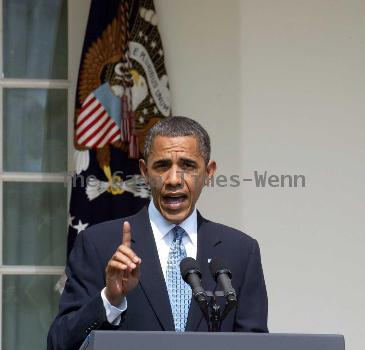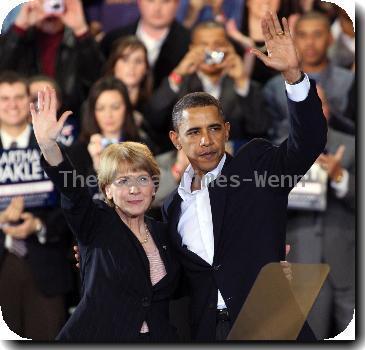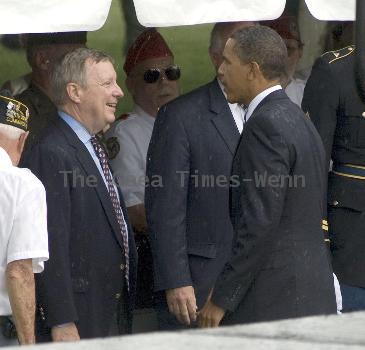Chicago’s Latino voters could be deciding factor in race to choose new mayor
By APTuesday, September 14, 2010
Latinos could be key in Chicago’s mayoral race
CHICAGO — Two days after Mayor Richard M. Daley announced he wouldn’t seek a seventh term, a group of Latino activists pondered an idea that seemed implausible the last time Chicago chose a new leader: An outcome decided by Latinos.
The group was hastily called to a restaurant in Little Village, a bustling neighborhood filled with clothing shops and taquerias that has grown into one of the nation’s largest Mexican enclaves. Over sweet bread and coffee, they discussed how the city’s demographics had changed since the last time Chicago had a wide-open mayoral race.
“There’s an opportunity for us to decide who runs Chicago for the next 20 years,” said Carlos Perez, editor of the Mayan Calendar News. “We have to put our own agenda together.”
Daley’s decision last week set off a scramble among potential successors and interest groups looking to attract candidates. And for the first time, Chicago’s burgeoning Latino population finds itself in position to be a deciding factor in the race to choose who will run the nation’s third-largest city.
Chicago’s demographics have shifted greatly since 1989, when Daley first took office at a time of racially contentious politics. Since then, the number of Latinos has soared to approximately 28 percent of the population, from 20 percent, while the number of blacks and whites declined.
For many years, the Latino electorate was fractured by division and low turnout. But it has become a more prominent voting bloc nationwide, as shown in the 2008 presidential election, when it helped put Barack Obama in the White House. Latinos have also proven they can mobilize, at least in favor of immigration reform, as seen in scores of immigration rallies held across the country beginning in 2006.
Several Latino leaders are running or considering doing so. City Clerk Miguel del Valle, born in Puerto Rico, was the first to declare his candidacy. U.S. Rep. Luis Gutierrez, whose family is Puerto Rican, says he’s leaning toward doing the same.
Some city leaders, including Alderman Danny Solis, have said it is unlikely a Latino candidate could win February’s election. The list of candidates is expected to be long, and the winner needs a majority vote. But, he said, Latino voters could help tip the scales if two candidates end up in a runoff in April.
Latinos currently represent around 15 percent of Chicago’s 1.5 million registered voters, according to rough estimates by the city’s Board of Elections. That’s approximately 200,000 votes.
But it’s difficult to predict if Latinos will unify behind one candidate, especially since they are hardly a monolithic group and have a mixed history of supporting a candidate solely because he or she is Latino, said Evan Bacalao, a spokesman for the nonpartisan National Association of Latino Elected and Appointed Officials.
He cites a special election last year where Democrat Judy Chu, an Asian-American, easily won a vacant U.S. House seat in a Los Angeles-area district where most residents are Hispanic.
Members of the group meeting in Little Village echoed that idea. But at the very least, they hope to make issues important to Latinos part of campaigns.
“There’s a change in the air, and we have to be a part of it,” said Carlos Castro, a member of Puerto Rican Concerned Voters. “But we will not support a candidate just because he’s Puerto Rican.”
Castro and others said schools, street violence and jobs were top issues. They also talked about how to work with, or in some cases against, other factions, including similar black coalitions forming in the city.
In 1990, almost 20 percent of the city’s nearly 2.8 million people were Latino, according to census data. Nearly 20 years later, about 28 percent of Chicagoans are Latino. In the same time period, the white population declined from 45 to 44 percent, as did the black population, from 39 to 34 percent.
But some are skeptical that things are much different.
“Chicago aspires to be world-class but is bogged by its own racial discrimination,” said Harold L. Lucas, president of the Black Metropolis Convention and Tourism Council in Chicago. “The next mayor of Chicago needs to put on a diversity hat and figure out the interests of all those groups and make it into one holistic, inclusive system.”
Daley has had a complicated relationship with Latinos.
Early in his term, Daley appealed to Latinos at a time when black and white voters were lining up along strict racial lines. He formed coalitions much like the city’s first black mayor, Harold Washington, and later organized community leaders into the powerful Hispanic Democratic Organization, which was loyal to City Hall. The organization weakened in recent years after one of its leaders was convicted of illegally handing out city jobs to political campaign workers.
Meanwhile, independent Latino candidates have run into trouble competing with Daley-backed candidates in the city’s Hispanic dominated wards.
So far, no clear favorites have emerged. Several prominent figures — including White House Chief of Staff Rahm Emanuel, Cook County Sheriff Tom Dart and U.S. Rep. Jesse Jackson Jr. — say they are considering running.
Some possible candidates have already begun targeting the city’s Latino voters. Gutierrez, a prominent figure in the fight for federal immigration reform, was among those gathering signatures at a recent Mexican Independence Day parade in Little Village, marching with volunteers wearing “Gutierrez for Mayor” T-shirts.
Emanuel may face trouble among Latinos. Members of the group in Little Village said their focus was to help find candidates who would be an alternative to Emanuel, who they believe has worked to keep immigration reform off the White House agenda.
Jorge Mujica, a one-time congressional candidate, said there is more incentive to vote now that there isn’t an incumbent in office.
“Latinos, generally speaking, don’t vote unless they know their vote is going to mean something,” he said. “Now’s the time to vote.”
As for the Latino activists and organizers, they say their first task is making a list of issues important to Latinos in Chicago, then finding a candidate who appeals to them. After that come candidate forums, voter registration drives and endorsements.
Del Valle, the city clerk who is already running for mayor, said coalitions and groups like the one forming in Little Village will be key to the mayoral election.
“Latinos are one of many groups out there that need to be addressed, and I will do that,” he said. “You cannot take any group for granted.”
Tags: African-americans, Barack Obama, Chicago, Hispanics, Illinois, Immigration Policy, Local Elections, Municipal Governments, North America, Race And Ethnicity, United States





